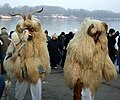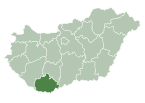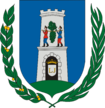Mohács
Mohács | |
|---|---|
 Aerial view | |
| Coordinates: 45°59′45″N 18°40′47″E / 45.99593°N 18.67985°E | |
| Country | |
| County | Baranya |
| District | Mohács |
| Government | |
| • Mayor | Ferenc Csorbai (MSZP) |
| Area | |
| • Total | 112.23 km2 (43.33 sq mi) |
| Population (2011) | |
| • Total | 17,808 |
| • Density | 158.67/km2 (411.0/sq mi) |
| Time zone | UTC+1 (CET) |
| • Summer (DST) | UTC+2 (CEST) |
| Postal code | 7700 |
| Area code | (+36) 69 |
| Website | www |
Mohács (Hungarian pronunciation: [ˈmohaːt͡ʃ]; Croatian and Bunjevac: Mohač; German: Mohatsch; Serbian: Мохач; Turkish: Mohaç) is a town in Baranya county, Hungary on the right bank of the Danube.
Etymology
The name probably comes from the Slavic *Mъchačь,*Mocháč: mъchъ (moss, Hungarian moha is a loanword from Slavic/) + the Slavic suffix -ačь, like Slovak Mochnáč or Czech Macháč.[1][2] See 1093/1190/1388 Mohach.[2]
History
Two famous battles took place there:
- Battle of Mohács, 1526
- Battle of Mohács, 1687
These battles represented the beginning and end, respectively, of the Ottoman domination of Hungary.
In Roman times there was a camp on the banks of the Danube near Mohács.
In the medieval Kingdom of Hungary, Mohács was part of the historical Baranya county, and during Ottoman rule it was the administrative seat of the Sanjak of Mohács, an Ottoman administrative unit. After the Habsburgs took the area from the Ottomans, Mohács was included in the restored Baranya county.
In 1910, the population of the Mohács district numbered 56,909 people, of whom 21,951 spoke German, 20,699 Hungarian, 4,312 Serbian, and 421 Croatian. Another 9,600 inhabitants were listed as speaking "other languages" (presumably Bunjevac and Šokac).[3]
Events
Every spring, the town hosts the annual Busójárás carnival.
Demographics
According to the 2011 census, the total population of Mohács was 17,808, of whom there were 15,842 (84.2%) Hungarians, 1,723 (9.7%) Germans, 700 (3.9%) Croats, and 537 (3%) Romani. 14% of the total population did not declare their ethnicity. In Hungary, people can declare more than one ethnicity (dual identity), so the sum exceeds the total population.[4][5]
Twin towns — sister cities
Mohács is twinned with:
 Beli Manastir, Croatia (1967)
Beli Manastir, Croatia (1967) Bensheim, Germany (1987)
Bensheim, Germany (1987) Câmpia Turzii, Romania (1990)
Câmpia Turzii, Romania (1990) Wattrelos, France (1993)
Wattrelos, France (1993) Siemianowice Śląskie, Poland (1999)
Siemianowice Śląskie, Poland (1999) Beykoz, Turkey (2008)
Beykoz, Turkey (2008) Sveti Filip i Jakov, Croatia (2014)
Sveti Filip i Jakov, Croatia (2014)
Notable citizens
- Ferenc Pfaff (1851–1913), Hungarian architect
- Endre Rozsda (1913–1919), Hungarian-French Painter
- Norbert Michelisz (1984), Hungarian racing driver
- Dunai Tamás (1949), Hungarian actor (hu:Dunai Tamás)
Photos
-
The Danube at Mohács
-
Town Hall
-
Church in the center of city
-
Memorial park
-
Memorial park
-
Annual carnival Busójárás
-
Buso masks
-
Carnival
-
Carnival
References
- This article incorporates text from a publication now in the public domain: Chisholm, Hugh, ed. (1911). "Mohács". Encyclopædia Britannica. Vol. 18 (11th ed.). Cambridge University Press. pp. 646–647.
- ^ Stanislav, Ján (2004). Slovenský juh v stredoveku II (in Slovak). Slovenské literárne centrum. p. 298. ISBN 80-88878-89-6.
- ^ a b Kiss, Lajos (1978). Földrajzi nevek etimológiai szótára (in Hungarian). Budapest: Akadémiai. p. 429.
- ^ "Archived copy". Archived from the original on 2008-03-29. Retrieved 2006-08-12.
{{cite web}}: CS1 maint: archived copy as title (link) - ^ Hungarian census 2011, Baranya County
- ^ Hungarian census 2011 - final data and methodology
External links
- Official website in Hungarian, English and German















